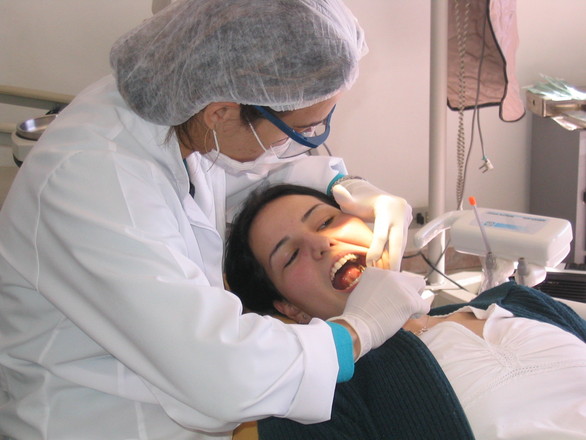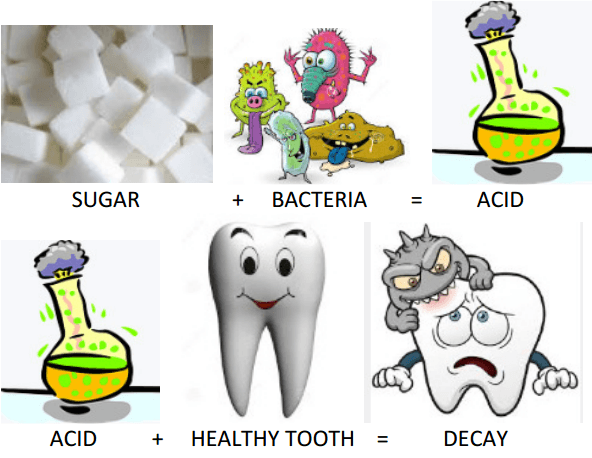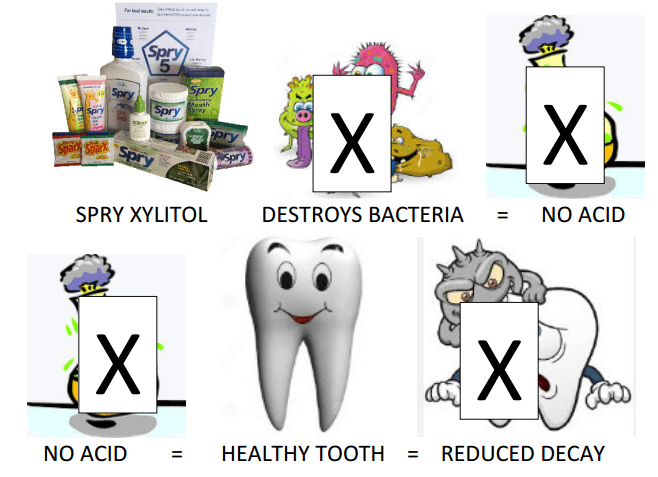
29 Nov Xylitol Dental Benefits
Although the oral health of New Zealanders has improved over time…….
……Dental decay remains the most prevalent chronic disease in New Zealand’*
Did you know that there are more than 600 different groups of bacteria in the human mouth? – But no need to panic as most of these bacteria are perfectly harmless or even beneficial to us. There is one particular type however called Streptococcus Mutans that has been shown to wreck havoc on our ‘pearly whites’ and directly linked to tooth decay.
These bacteria break down sugars from our food and drinks and produce acids which attack the hard enamel on the surface of your teeth. Even though tooth enamel is the hardest substance in the body, (harder than ivory even!),,continued exposure to these acids gradually dissolves the enamel, leaving the teeth susceptible to decay.
Bacteria love this acid environment and continue to multiply leaving in their wake a trail of waste products known as plaque. Plaque is that white furry stuff that collects on your teeth if you don’t brush. If plaque isn’t removed on a daily basis, it accumulates and can harden into tartar. Tater cannot be removed by a toothbrush so you need to have this removed by your dental professional.
If plaque accumulates beneath the gum line, tartar, bacteria, acids, and toxins build up and can cause irritation and inflammation of the gum tissue called gingivitis and periodontal disease. Left unchecked this can eventually lead to structural damage of the teeth and the bone supporting the teeth and gums and ultimately tooth loss.
Sugar is used by bacteria to produce energy for reproduction. Because xylitol has a different chemical structure to that of sugar it is unable to be broken down by the bacteria. So. With no energy being generated the S. mutans die and are flushed out of the body
The number of acid-producing bacteria may fall by as much as 90% and since no acid is formed, the pH of saliva does not fall. When the pH is above 7, calcium and phosphate salts are able to move back into the enamel of the tooth aiding remineralisation
Xylitol also acts a bit like Teflon coating and helps prevent plaque from physically adhering to the teeth and thereby helps to stop demineralization before it even begins.
The unique 5-carbon structure of xylitol helps to keep calcium available in a useful form so it too encourages remineralization.
Xylitol can also stimulate saliva which in itself protects the mouth and teeth. Saliva containing xylitol is more alkaline than saliva containing other sugar products.
Less Bacteria = Less Acid = Healthier Teeth!
The secret to xylitol’s effectiveness is the frequent use on a daily basis.
Research shows that a mere 4 to 5 exposures of 100% xylitol spread throughout the day is enough and hundreds of studies and clinical trials have confirmed these effects.
It’s so easy to incorporate xylitol into your daily routine. See example below;
- Brush with xylitol toothpaste in the morning and rinse with xylitol Mouthwash
- Xylitol gum, gems or candies after morning tea or coffee
- Xylitol gum, gems or candies after lunch
- Xylitol gum, gems or candies dinner
- Brush with xylitol toothpaste before bed and rinse with xylitol Mouthwash
…..and that actually gives you SEVEN exposures!!!!
NB To be most effective make sure products contain 100% xylitol. By incorporating other sugars such as, sorbitol, maltitol and other sweeteners you are reducing its effectiveness. (Basically what we are trying to do is “starve” the bacteria, so if there are other sugars in the product you are making it harder for the xylitol to do its job.
What sugar does to your teeth?

How xylitol helps your teeth

If used only occasionally or even as often as once a day, xylitol may NOT be effective, regardless of the amount.
YOUR MOUTH IS THE GATEWAY TO THE REST OF YOUR BODY
Are Dental Health and General Health Linked?
Some medical conditions can make you more susceptible to dental issues.
Poor oral health can cause issues elsewhere in your body.
What comes first? The chicken or the egg?
Many people see a dentist about their teeth and gums and a doctor for the rest of their body health, however it stands to reason that as both are connected then we should look at the whole as one entity influencing the other.
More and more we are discovering the impact of poor dental health on the rest of the body and coming to the realisation that by taking more care of our mouths we can in fact improve our overall well-being.
Your oral health might contribute to various diseases and conditions, including:
- Endocarditis is an infection of the inner lining of your heart and typically occurs when bacteria or other germs from another part of your body, such as your mouth, spread through your bloodstream and attach to damaged areas in your heart.
- Cardiovascular disease. Some research suggests that heart disease, clogged arteries and stroke might be linked to the inflammation and infections that oral bacteria can cause.
- Pregnancy and birth. Hormonal changes that occur during pregnancy and birth can have a huge impact on your dental health so it is of even more importance to be extra vigilant during this time. Periodontitis has been linked to premature birth and low birth weight, which can further contribute to other problems later in the babies life.
There are over 100 diseases linked to chronic periodontal (inflammation of the gums) disease and tooth decay.
Some of the diseases and conditions that may be linked to the condition of your mouth:
- Diabetes increases your risk of gum disease, cavities,tooth loss, dry mouth, and a variety of oral infections. It can also make your diabetes more difficult to control as infections and inflammation may cause your blood sugar to rise and affect your insulin levels.
- Osteoporosis: The first stages of bone loss may show uparound your teeth, as the bone supporting your teeth becomes more susceptible to damage. Your dentist may spot this on a routine examination or with dental X-rays.
- Cardiovascular (heart) disease. Research shows that several types ofcardiovascular disease may be linked to oral health including heart disease, clogged arteries, and stroke. Even when treated periodontal disease can continue to be a Those with a history of periodontal disease can have a higher risk of having a stroke than those who had never developed it at all
- Pregnancy and birth. It is vital to maintain excellent oral health before you get pregnant and during your pregnancy since hormonal changes can affect the gums and surrounding tissues and has been linked topremature birth and low birth-weight babies.
- Cancer. While much of the research is in the early stages, scientists think that chronic infection in the mouth can trigger inflammation throughout the body. This, in turn, may spark a chemical process in the body that results in high levels of cancer-causing compounds known as nitrosamines.
- HIV/ AID Oral problems are very common with HIV/AIDs andare caused by fungal, viral, or bacterial infections, Symptoms can include ulcers, dry mouth, and other related painful lesions. (ne of the first signs of AIDS may be severe gum infection)
- Having rotting or missing teeth can have a profound psychological effect on a person’s self-esteem and therefore on their ability to gain employment and interact on a social level.
- General ‘Poor health’. Tooth loss may result in the inability to eat a range of foods and therefore deprive the body of important vitamins and minerals necessary to maintain normal body functions.
Taking care of your oral health is an investment in your overall health. Practice good oral hygiene every day by;
- Brushing your teeth at least twice a day with fluoride toothpaste.
- Flossing daily.
- Eating a healthy diet and limit between-meal snacks.
- Replacing your toothbrush every three to four months or sooner if bristles are frayed.
- Scheduling regular dental checkups and cleanings.
- Avoiding tobacco use.
- Incorporating xylitol in the form of sweets, gums and candies and in toothpastes and mouth rinses as part of your daily routine
Also, contact your dentist as soon as an oral health problem arises.
